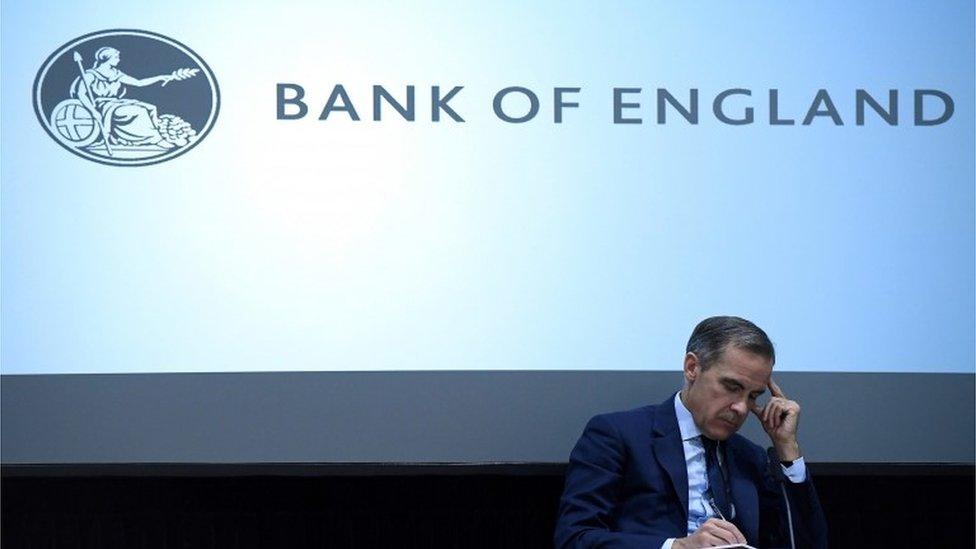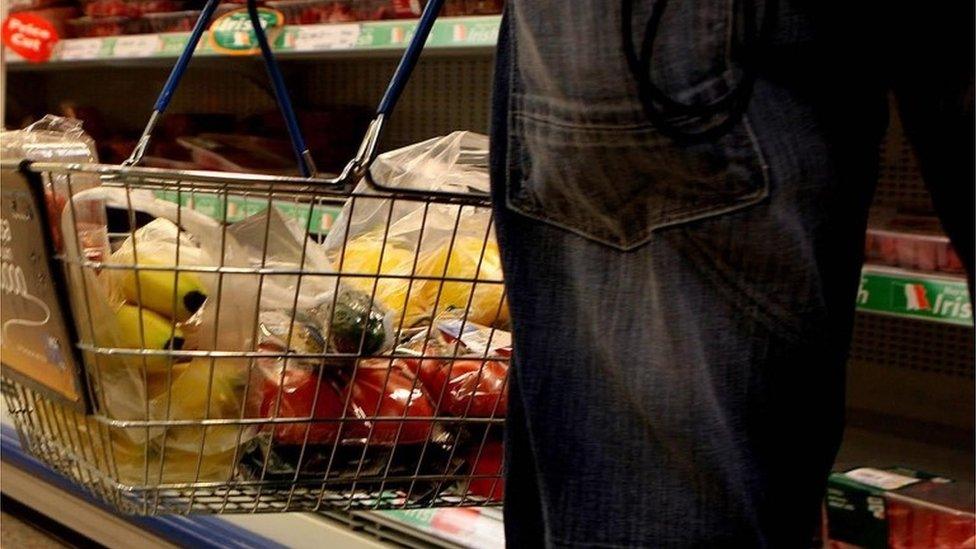Has the 'Brexit effect' disappeared?
- Published

Bank of England Governor, Mark Carney might have stashed a couple of party poppers in his pocket
Hang out the bunting - well, at least buy a couple of party poppers.
Another upgrade like today's and the Bank of England will be more positive than it was about the British economy in May last year - its final Inflation Report before the referendum.
At that point it forecast growth for 2016 would be 2% (which turned out to be right), rising to 2.3% for 2017 and staying there for 2018.
It assumed that Britain would remain in the EU as that was official government policy.
Then came the referendum, Brexit and the Bank's August Inflation Report - which will go down in history as the point of maximum exit fear at Threadneedle Street, the Gloomflation Report.
The Bank slashed growth projections to 0.8% for 2017 and 1.8% for 2018, a huge downgrade which would have resulted - if the forecasts came to pass - in an economy billions of pounds smaller than previously projected.
Substantial
Since then, Mark Carney and the members of the Monetary Policy Committee have become much more chipper.
In November, the Bank upgraded its growth forecasts by 0.6% for 2017, one of the most substantial increases it has ever published.
Today that tone has continued, another substantial upgrade for this year and - as importantly - a small upgrade for next year which many believe will be the moment any negative Brexit effects actually start to crystallise as Britain enters the hard yards of the exit process.
Does that mean the Brexit effect has disappeared?
Not according to the Bank.
It still believes - even with these substantial upgrades - that by 2019 the UK economy will be 1.5% smaller than it would have been had Britain voted to stay in the EU.
And with a total gross domestic product of around £2 trllion, that's still a substantial sum.
Though it should be pointed out that the figure is significantly better than the 2.5% it judged the gap would be last November.
Dove
The Bank still has plenty of warning lights flashing on the dashboard.
Business investment is expected to fall.
And the decline in the value of sterling has boosted inflation, with the Bank warning today that wage growth is likely to stall and consumer consumption - one of the key drivers of economic growth - slow.
Interestingly, though, the Bank has become a little more doveish on the inflation issue as the pound has strengthened slightly over the last two months.
And as the major retailers battle over market share, food prices are actually falling, not rising.
Though the same cannot be said of fuel and input prices - that's the costs businesses pay for the products they use - which are both rising rapidly.

Food prices are falling - offsetting overall inflation
Help
Why has the Bank become much more bullish on the economy?
First, the effects of stimulus measures taken after the referendum are starting to feed through.
The Bank and the government have taken broadly expansionary policy positions over the last six months.
The Bank has cut interest rates and provided more financial support - quantitative easing - for banks and businesses.
Phillip Hammond's Autumn Statement relaxed deficit reduction targets and laid out plans to boost infrastructure spending.
Beyond that, consumer confidence has remained robust as low interest rates have supported credit expansion and spending.
That has maintained demand, which is good for an economy dominated by the services sector.
With inflation rising, the Bank has become slightly more hawkish on the possibility of an interest rate rise this year or next.
Which would be welcomed by many savers, if not mortgage holders.
Trump Jump
Second, Britain does not live in a Brexit bubble.
The global economy is becoming stronger.
Far from a Trump Dump, there has been a Trump Jump with businesses predicting that presidential promises of a fiscal stimulus to support infrastructure investment and tax cuts for individuals and firms will boost growth.
The rest of Europe is also posting some better economic growth figures.
Both have a positive effect on the UK economy, an exporting nation which is enjoying the fruits of a weaker currency.
The Bank insists there is still a Brexit effect on the downside - and the Governor will be braced for more criticisms that the August report was simply too negative.
Yes, the Bank is more chipper.
But, it is still wary about the future.